Eco-lodges, beacons of sustainable tourism, offer an unparalleled opportunity to immerse ourselves in the wonders of nature while minimizing our environmental impact. These unique accommodations, designed with ecological principles at their core, provide a transformative travel experience that fosters a deep connection with the natural world.
From their environmentally conscious practices to their immersive experiences, eco-lodges invite us to embrace a greener way of traveling. Join us as we delve into the fascinating world of eco-lodges, exploring their environmental benefits, architectural marvels, and the unforgettable experiences they offer.
Eco-Lodge Definition
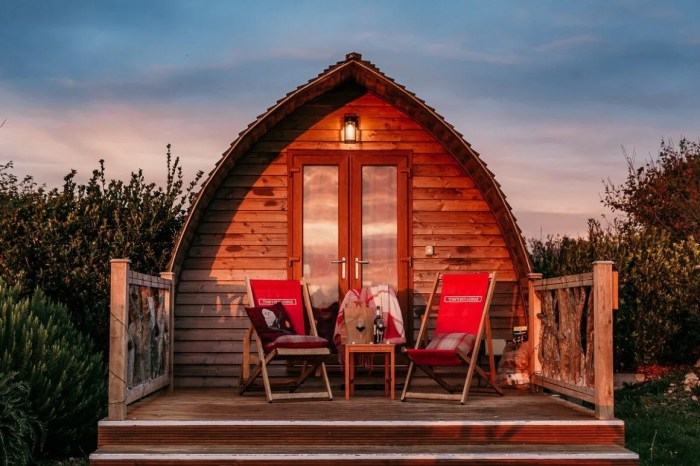
Eco-lodges, a form of sustainable tourism accommodation, prioritize environmental conservation and responsible tourism practices. They are designed and operated with a focus on minimizing their ecological footprint while enhancing the surrounding environment and promoting cultural preservation.
Key characteristics that distinguish eco-lodges from traditional accommodations include:
- Construction and design that emphasizes the use of sustainable materials and techniques.
- Energy efficiency and renewable energy sources to reduce carbon emissions.
- Water conservation and wastewater management systems.
- Community involvement and support for local conservation efforts.
li>Waste management practices that minimize environmental impact.
Environmental Practices
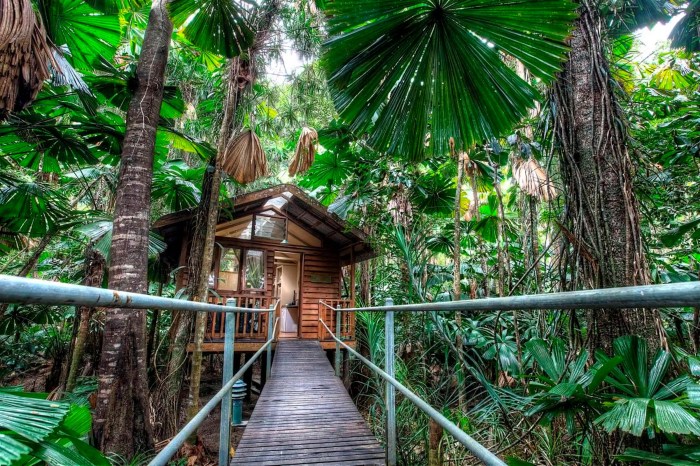
Eco-lodges embrace environmental practices to minimize their ecological footprint and operate sustainably. These practices include:
– Utilizing renewable energy sources like solar and wind power to reduce reliance on fossil fuels.
– Implementing water conservation measures such as rainwater harvesting and low-flow fixtures to minimize water usage.
– Employing energy-efficient appliances, lighting, and insulation to reduce energy consumption.
– Promoting responsible waste management practices through recycling, composting, and minimizing single-use plastics.
– Protecting and preserving local ecosystems through habitat restoration, wildlife conservation, and minimizing noise pollution.
Sustainable Building Practices
Eco-lodges prioritize sustainable building practices to reduce their environmental impact:
– Utilizing sustainable building materials such as bamboo, recycled wood, and locally sourced materials to minimize deforestation.
– Designing buildings to optimize natural ventilation, lighting, and passive solar energy to reduce energy consumption.
– Employing energy-efficient construction techniques like double-glazed windows and insulated walls to minimize heat loss.
– Incorporating green roofs and living walls to provide insulation, reduce stormwater runoff, and enhance biodiversity.
Water Conservation Initiatives
Eco-lodges implement water conservation initiatives to minimize water usage:
– Installing low-flow showerheads, faucets, and toilets to reduce water consumption.
– Implementing rainwater harvesting systems to collect and store rainwater for non-potable uses like irrigation.
– Employing water-efficient landscaping techniques such as xeriscaping and native plant species to minimize water needs.
– Educating guests on water conservation practices and encouraging responsible water usage.
Waste Management Strategies
Eco-lodges adopt responsible waste management strategies to minimize their environmental impact:
– Implementing comprehensive recycling programs for paper, plastic, metal, and glass to divert waste from landfills.
– Utilizing composting systems to convert organic waste into nutrient-rich soil amendments.
– Reducing single-use plastics by providing reusable water bottles, biodegradable amenities, and eliminating plastic packaging.
– Educating guests on responsible waste disposal practices and encouraging waste reduction.
Social and Economic Benefits
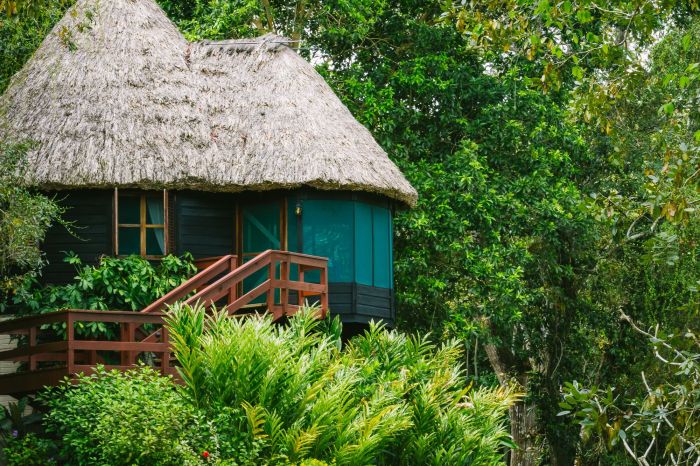
Eco-lodges contribute significantly to the social and economic well-being of local communities. They serve as catalysts for job creation, promote sustainable livelihoods, and empower local communities through various initiatives.
Eco-lodges provide a unique blend of sustainability and comfort, offering a chance to immerse yourself in nature without sacrificing luxury. For those seeking a more opulent beach experience, luxury beach resorts offer lavish accommodations and amenities, while still prioritizing eco-friendly practices.
However, for travelers who value a deep connection with the environment, eco-lodges remain the preferred choice, seamlessly integrating nature and comfort for an unforgettable stay.
Job Creation and Economic Opportunities
Eco-lodges create direct and indirect employment opportunities in the tourism sector. Local residents are employed in various roles, including hospitality, guiding, maintenance, and administration. The income generated from eco-tourism supports local businesses, such as restaurants, shops, and transportation services.
Sustainable Livelihoods
Eco-lodges support sustainable livelihoods by providing alternative income sources for local communities. By promoting responsible tourism practices, eco-lodges encourage visitors to respect the environment and support local businesses. This creates a sustainable economic cycle that benefits both the community and the environment.
Community Involvement and Empowerment
Eco-lodges actively involve local communities in their operations. They consult with local leaders and residents to ensure that the lodge’s activities align with community needs and priorities. Many eco-lodges also implement initiatives to empower local communities, such as education programs, skills training, and community development projects.
Architectural Design
Eco-lodges prioritize sustainable and environmentally friendly design principles. These principles focus on minimizing the lodge’s environmental impact while promoting energy efficiency and harmony with the surrounding natural environment.
Architectural designs for eco-lodges often incorporate:
- Use of natural and local materials that blend seamlessly with the surroundings
- Passive solar design to maximize natural light and ventilation, reducing energy consumption
- Energy-efficient appliances and lighting systems
- Water conservation measures, such as rainwater harvesting and low-flow fixtures
- Waste management systems that minimize environmental impact
Innovative and Sustainable Architectural Designs
Eco-lodges often showcase innovative and sustainable architectural designs that push the boundaries of eco-friendly construction. Examples include:
- The Manta Resort on Pemba Island, Tanzania, features underwater rooms that provide guests with a unique marine experience while minimizing disturbance to the coral reef.
- The Treehotel in Harads, Sweden, offers treehouse accommodations that blend seamlessly with the surrounding forest, using sustainable materials and minimizing environmental impact.
- The Campi ya Kanzi in Kenya incorporates traditional Maasai design principles with modern eco-friendly technologies, creating a culturally immersive and sustainable experience for guests.
Unique Experiences

Eco-lodges offer guests unparalleled experiences that immerse them in the natural world. These experiences foster a deep connection with the environment, promoting environmental awareness and education.
Guests can engage in a range of activities tailored to the unique ecosystems surrounding each lodge. From guided nature walks and wildlife safaris to kayaking and snorkeling expeditions, these activities provide opportunities to observe and interact with local flora and fauna.
Eco-lodges offer a unique way to connect with nature and create lasting family memories. If you’re seeking the best family vacation spots , consider eco-lodges that prioritize sustainability and immerse you in stunning natural environments. These lodges often feature comfortable accommodations, engaging activities, and educational programs that cater to families of all ages, providing a perfect balance of adventure and relaxation.
Immersive Nature
Eco-lodges are designed to blend seamlessly into their natural surroundings, minimizing their environmental impact while maximizing the guest experience. Guests can enjoy stunning views of the surrounding landscapes from their private balconies or terraces, and many lodges offer outdoor dining areas that allow for immersive dining experiences amidst the sights and sounds of nature.
Eco-lodges offer a sustainable and immersive travel experience, allowing travelers to connect with nature while minimizing their environmental impact. Planning a trip to an eco-lodge can be budget-friendly with the help of a travel budget calculator. By factoring in costs like accommodation, food, activities, and transportation, you can estimate your expenses and plan accordingly.
Eco-lodges often offer affordable rates, making them a great option for budget-conscious travelers seeking a unique and eco-friendly adventure.
Educational Opportunities
Eco-lodges often collaborate with local experts and organizations to provide educational programs for guests. These programs may include lectures on local ecology, guided hikes with naturalists, and workshops on sustainable practices. By participating in these programs, guests gain a deeper understanding of the environment and the importance of conservation.
Wildlife Encounters
Eco-lodges are often located in areas with abundant wildlife, providing guests with opportunities for unforgettable wildlife encounters. Guests may have the chance to spot endangered species, observe animal behavior, and learn about the importance of preserving these ecosystems.
Marketing and Promotion
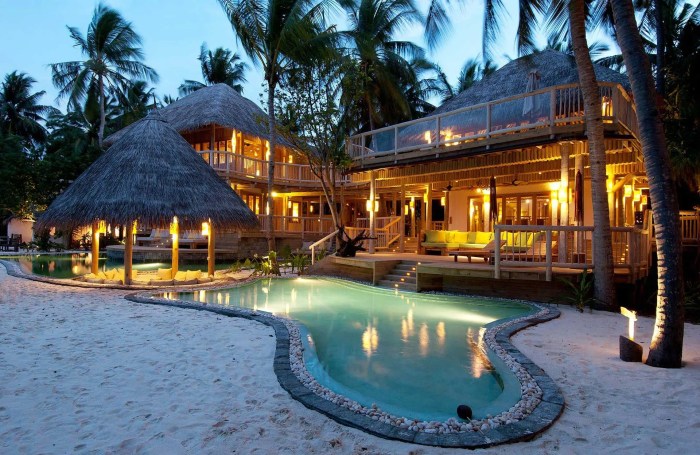
Marketing and promoting eco-lodges effectively is crucial for attracting eco-conscious travelers. Strategies should highlight the eco-friendly aspects and unique experiences offered, while effectively reaching the target audience.
Highlighting the eco-friendly practices and sustainable initiatives of eco-lodges is essential. This includes emphasizing their efforts in energy efficiency, water conservation, waste management, and local community involvement. Promoting the unique experiences offered by eco-lodges is also important, such as wildlife viewing, nature trails, and cultural immersion.
Digital Marketing
- Create a website and social media presence that showcases the eco-lodge’s sustainable practices and unique offerings.
- Utilize search engine optimization () and content marketing to improve online visibility and reach.
- Engage with potential guests on social media, responding to inquiries and sharing updates on eco-friendly initiatives.
Partnerships and Collaborations, Eco-lodges
- Partner with eco-tourism organizations and travel agencies that cater to eco-conscious travelers.
- Collaborate with local businesses and communities to offer sustainable experiences and support the local economy.
- Offer discounts and promotions to eco-conscious travelers, such as those who book directly or use sustainable transportation.
Content Marketing
- Create compelling blog posts, articles, and videos that highlight the eco-lodge’s sustainability efforts and unique experiences.
- Share stories and testimonials from guests who have enjoyed the eco-lodge’s eco-friendly and immersive offerings.
- Use social media to share updates on conservation initiatives, wildlife sightings, and community involvement.
Successful Marketing Campaigns
- The “Leave No Trace” campaign by Patagonia highlights the importance of responsible travel and encourages guests to minimize their environmental impact.
- The “Stay Another Day” campaign by the Costa Rican Tourism Board encourages visitors to extend their stay in the country to support local communities and experience its rich biodiversity.
- The “Responsible Travel Pledge” by the World Travel & Tourism Council (WTTC) encourages businesses to adopt sustainable practices and empower travelers to make responsible choices.
Case Studies
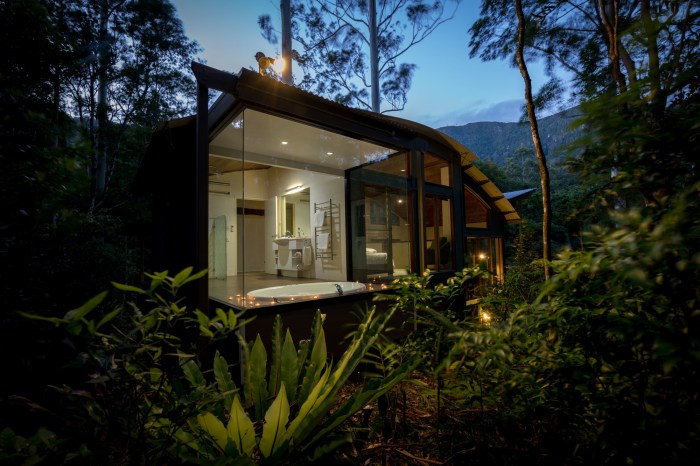
Eco-lodges are gaining popularity as travelers seek more sustainable and immersive travel experiences. To provide real-world examples of best practices, we present case studies of eco-lodges that have achieved success in sustainability, community engagement, and guest experiences.
These case studies will highlight the key factors that have contributed to their success, including innovative architectural design, community partnerships, and unique guest programs. By sharing lessons learned and insights, we aim to inspire and guide other eco-lodge developments.
El Nido Resorts, Palawan, Philippines
El Nido Resorts is a group of six eco-resorts located in the Bacuit Bay area of Palawan, Philippines. The resorts are renowned for their commitment to sustainability and community engagement.
- Sustainable Practices: El Nido Resorts has implemented various eco-friendly practices, such as using solar power, rainwater harvesting, and composting waste. They also work with local communities to protect and restore the surrounding environment.
- Community Engagement: The resorts actively engage with local communities through various initiatives, including providing employment opportunities, supporting local businesses, and funding community projects.
- Guest Experiences: El Nido Resorts offers a range of unique guest experiences, such as island hopping, snorkeling, and kayaking. They also provide opportunities for guests to learn about the local culture and environment.
Inkaterra Reserva Amazonica, Peru
Inkaterra Reserva Amazonica is an eco-lodge located in the Peruvian Amazon rainforest. The lodge is known for its luxurious accommodations and its focus on sustainable tourism.
- Sustainable Practices: Inkaterra Reserva Amazonica has implemented strict environmental policies, including using renewable energy sources, minimizing waste, and protecting the surrounding rainforest.
- Community Engagement: The lodge works closely with local communities to promote sustainable practices and support conservation efforts.
- Guest Experiences: Guests at Inkaterra Reserva Amazonica can enjoy a variety of activities, such as guided nature walks, wildlife viewing, and cultural immersion experiences.
Borneo Rainforest Lodge, Malaysia
Borneo Rainforest Lodge is an eco-lodge located in the Danum Valley Conservation Area in Sabah, Malaysia. The lodge is known for its unique architectural design and its commitment to preserving the rainforest.
- Architectural Design: The lodge is built using sustainable materials and designed to minimize its impact on the environment. The buildings are elevated on stilts to protect the forest floor and provide panoramic views of the rainforest.
- Sustainable Practices: Borneo Rainforest Lodge uses renewable energy sources, recycles waste, and supports local conservation efforts.
- Guest Experiences: Guests at the lodge can experience the rainforest through guided walks, wildlife viewing, and cultural immersion programs.
Challenges and Opportunities
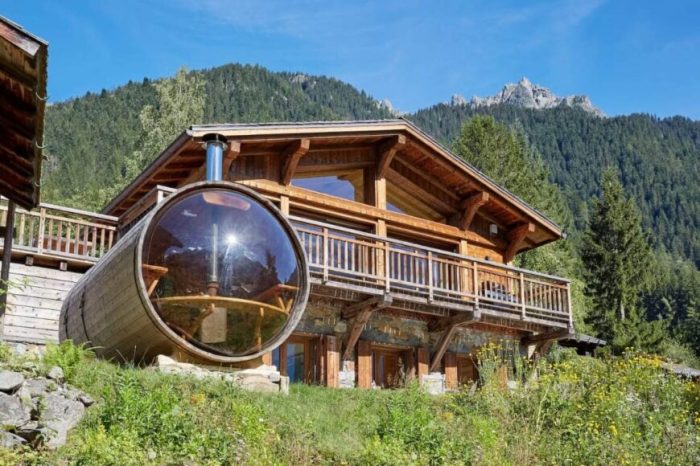
Eco-lodges face the challenge of balancing environmental sustainability with financial viability. They must minimize their environmental impact while also generating enough revenue to cover their operating costs and make a profit.
There are several opportunities for growth and innovation within the eco-lodge sector. Eco-lodges can develop new ways to reduce their environmental impact, such as using renewable energy sources and implementing sustainable waste management practices. They can also offer unique experiences to guests, such as wildlife viewing and educational programs.
Emerging Trends and Technologies
Several emerging trends and technologies can enhance the sustainability and appeal of eco-lodges. These include:
- The use of renewable energy sources, such as solar and wind power.
- The implementation of sustainable waste management practices, such as composting and recycling.
- The use of green building materials and techniques.
- The development of new technologies to reduce water and energy consumption.
Closing Summary: Eco-lodges
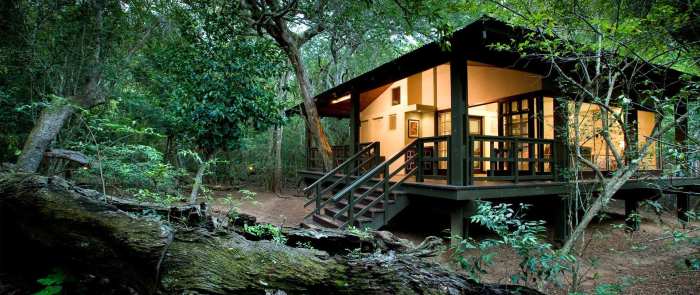
As we conclude our exploration of eco-lodges, it becomes evident that they are not merely accommodations but gateways to a more sustainable and fulfilling travel experience. By embracing eco-friendly practices, supporting local communities, and showcasing the beauty of nature, eco-lodges empower travelers to become active participants in preserving our planet’s precious ecosystems. As the demand for responsible tourism continues to rise, eco-lodges will undoubtedly play a pivotal role in shaping a more sustainable future for the travel industry.
Answers to Common Questions
What is the main goal of eco-lodges?
Eco-lodges prioritize minimizing their environmental impact while offering guests a memorable and immersive nature experience.
How do eco-lodges contribute to local communities?
Eco-lodges often create job opportunities, support local businesses, and empower communities through involvement in conservation efforts.
What are some unique experiences offered by eco-lodges?
Eco-lodges provide guests with opportunities for wildlife viewing, guided nature walks, and educational programs that foster a deeper appreciation for the environment.